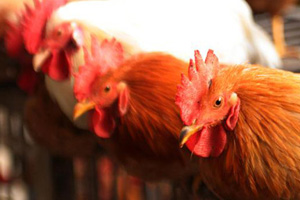Promiscuity improves genetic quality of birds

New research from the University of East Anglia has shown that females can maximise the genetic quality of their offspring by being promiscuous.
Researchers studied red junglefowl (the wild ancestor of the domestic chicken) in a collaborative project with the University of Oxford, Stockholm University and Linköping University.
Findings published in the journal Proceedings of the Royal Society B reveal that mating with different males helps females produce offspring that are more resistant to diseases. The findings will be important for animal breeders as well as conservation projects because they show that allowing multiple matings will produce the most disease resistant and genetically healthy offspring.
This is down to ‘cryptic female choice’ – where an internal mechanism in their reproductive tract favours the sperm from males that are most genetically different to them.
The genes in question (Major Histocompatibility Complex; MHC) play a key role in detecting and fighting infections. By biasing fertilisation in favour of MHC-dissimilar males, females increase the diversity of MHC within their offspring, providing them with better disease resistance.
The findings will be important for animal breeders as well as conservation projects because they show that allowing multiple matings will produce the most disease-resistant and genetically-healthy offspring.
Prof David S Richardson, from UEA’s school of Biological Sciences, said: “Our research has shown that the females don’t need to choose between males to produce the most healthy offspring. Rather by mating with multiple males, they allow their internal choice mechanism to favour the most genetically different sperm.”
The research investigated both experimentally controlled natural matings and artificial inseminations and found that the effect observed in natural matings was lost during artificial insemination.
“To optimise the quality of offspring produced in breeding programs we may need to make sure that females mate with multiple males and that they avoid artificial insemination, which could lead to the genetic health of bred stocks being weaker,” Richardson added.
“Many breeding programmes for livestock and conservation use artificial insemination. But our research suggests that this may not produce the best quality offspring. This is because the effect appears to require the subconscious female assessment of the male by some cue during actual mating.
“So having correct cues during mating, perhaps the smell of the male, can affect a females’ chances of being fertilised. And the cues from different males may not work equally well on different females. This is something that needs to be explored further in various animals including humans.”
The research was funded by BBSRC, the Natural Environmental Research Council (NERC), Stockholm University, the Schwartz’ foundation, Lars Hierta’s foundation, Knut & Alice Wallenberg’s foundation, the Royal Swedish Academy of Science, and the Royal Swedish Academy of Agriculture and Forestry.













